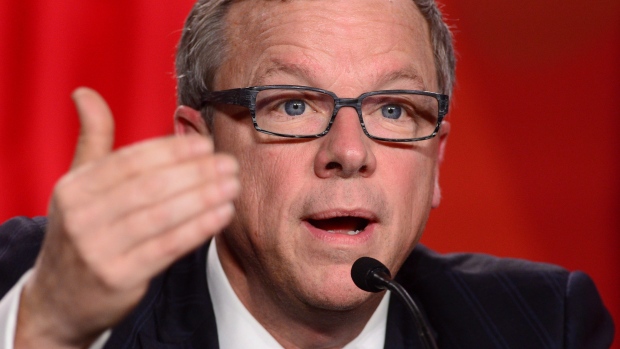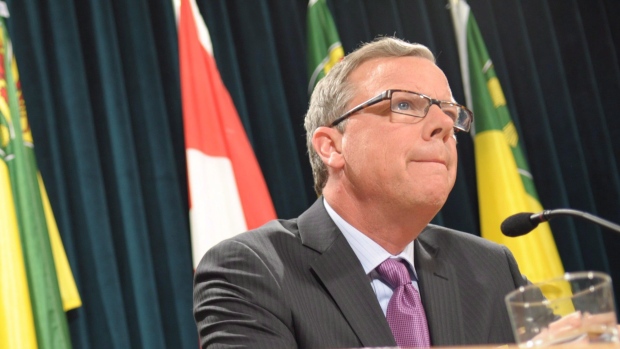Aug 10, 2017
'It's time for renewal': Brad Wall to retire from politics
BNN Bloomberg

Brad Wall is going to retire as premier of Saskatchewan, and from politics at large.
He made the announcement via Facebook Thursday afternoon, saying he has decided to launch the process for his Saskatchewan Party to elect a new leader, who will be handed the reins to the province.
“It’s time for renewal,” Wall told BNN in an interview Thursday. “Renewal’s not only good for the party that I lead but for it’s good for the province, too. We’re kinda showing some signs of economic strength again and some good forecasts out there, and getting our finances back in order again. So, now’s the time to continue that momentum with some renewal.”
He also added that he’s not giving up the job just yet and will continue to be a player on important issues such as pipeline policy, the carbon tax and Canada’s coming NAFTA renegotiation.
“A lot of those issues will culminate, I think, in the next number of months and there’s not an exact date [for a party leadership convention] yet … so I’m going to continue to serve as Premier until then and I’m honoured to do so.”
Wall’s Saskatchewan Party swept to victory in the 2007 election, defeating the long-ruling New Democrats, and has held a majority in the province for the last three terms. Under his administration, economic output from the province has risen nearly 20 per cent, as resource investment took off.
Wall has been a tireless advocate for Saskatchewan’s resource sector, clashing repeatedly with Parliament Hill over the imposition of carbon taxes on any province that doesn’t price emissions itself, describing the Federal government’s white paper on the matter as a “ransom note.”
The carbon tax has been far from the only sticking point Wall has had with Ottawa, arguing that the hand-wringing over approving new pipeline projects along with the tax was a one-two punch for an economy already grappling with the downturn in energy prices. In a September 2016 interview on BNN, Wall said the federal government was too focused on the needs of Central Canada and warned delays with approving Energy East were a threat to national unity.

He did not let up in his criticism of Canada’s pipeline policy, even on the day he announced he’ll be stepping down. He took aim at British Columbia’s Thursday decision to seek intervener status in Kinder Morgan’s planned Trans Mountain pipeline extension.
“It’s very disappointing to see B.C. take their stand. It begs the questions: What about some other product that B.C. decides they don’t like?” Wall told BNN.
“This country works because we can have commerce between jurisdictions and move what we do best across the country. If that oil is not coming from Canada to the world that wants it, it’s coming from countries that don’t care as much about the environment, that don’t have a good a human rights record. So, there’s also a case to be made for Canada being part of the answer and to do that, we need friendly ports in our own country and the chance to move oil to tidewater here in Canada.”
While he’s often found himself in pitched battles with Federal officials, one of his final keystone acts was helping to break down internal trade barriers.
Wall, former Alberta Premier Dave Hancock and former B.C. Premier Christy Clark were the early proponents of an overhaul of interprovincial trade policy, sending a letter to their provincial counterparts in 2014 to argue for a new deal. The resulting Canada Free Trade Agreement borrowed heavily from the New West Partnership the three provinces were a part of, including the use of a negative list to determine which items would be exempt from the deal.
In spite of the back-and-forth with the current federal administration, Wall’s greatest fight for the province’s resource sector ultimately gained Ottawa’s support.
In 2010, Wall waged a vocal battle against global fertilizer giant BHP Billiton’s US$38.6-billion hostile offer for Potash Corporation of Saskatchewan. Wall opposed the sale, arguing potash was a strategic resource that should not fall into foreign control. At the eleventh hour, Industry Minister Tony Clement agreed, effectively killing the deal.
The battle helped supercharge Wall’s rise into national prominence, as the plain-spoken Swift Current native became a firebrand for the small-c Conservative movement. Speculation abounded Wall may consider a run at the federal level, but his lack of French language skills would have been a hefty hurdle to clear.








